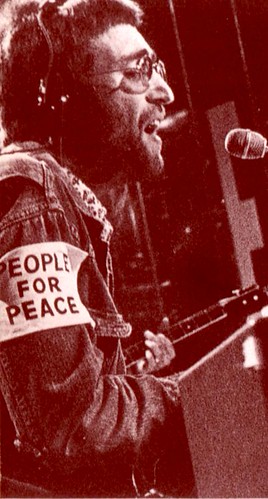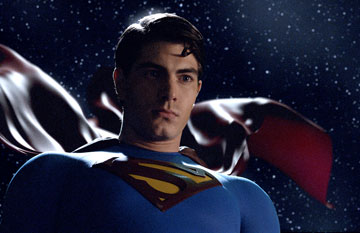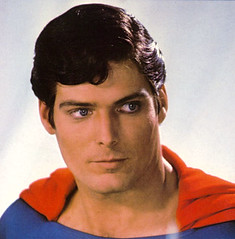 Witnessing the current violence between Israel and Lebanon, along with the escalation of hostility between the U.S., North Korea, and Iran, and the ongoing war in Iraq, proves to me now more than ever that in order to survive beyond this century, to say little of this very decade, this world must take a stand in defiance of war, and fully embrace the cause of peace. The stakes of war have become higher than ever, with the fate of all mankind inching ever closer to the balance of all conflicts. As the world becomes increasingly globalized, interconnected, and interdependant, what was once global becomes ever more local, and all violence becomes local as well.
Witnessing the current violence between Israel and Lebanon, along with the escalation of hostility between the U.S., North Korea, and Iran, and the ongoing war in Iraq, proves to me now more than ever that in order to survive beyond this century, to say little of this very decade, this world must take a stand in defiance of war, and fully embrace the cause of peace. The stakes of war have become higher than ever, with the fate of all mankind inching ever closer to the balance of all conflicts. As the world becomes increasingly globalized, interconnected, and interdependant, what was once global becomes ever more local, and all violence becomes local as well.
If the twentieth century was notable for its wars, it was also notable for the moral certainty underpinning its most notorious conflicts. Yet, following the irresolution of the Korean War, and continuing through Vietnam, Israel, and now Iraq, war has lost all pretense of glory, losing the certainty of victory among the growing pallor of ambiguity. Perhaps the true turning point was the destruction of Hiroshima and Nagasaki under America's newfound atomic might. Never had warfare been more technological, more industrial, more effectively inhuman, and never again would human history rise and fall with the tides of war. In the atomic age, the new certainty was that after war there would only be a fall.
Our current war in Iraq was sold on the bonds of moral certainty, and shamefully, I bought more than my share. I was less concerned by Bush II's chicken-little cries of anthrax and dirty bombs, and more convinced that Iraq would be better off without Saddam running it. Though I had no reasonable evidence to support such an expectation, I expected our incursion into Iraq would be swiftly followed by efforts to support Iraq's infrastructure, and that a new government would soon be nurtured into place. The latter expectation was based on a misunderstanding of the bitter gulf between Sunni and Shiite muslims; the former expectation must have been fostered by some kind of temporary insanity that led me to forget the ribald ineptitude that had been the early days of the W administration. Iraq was stupidly allowed to devolve into a prehistoric state; utilities were shut off, libraries museums and archives were ransacked, and basic safety and security was obliterated by what has become the hallmark of post-atomic warfare--guerilla insurgency.
I was wrong about Iraq. So was John Kerry, apparently, though he failed in articulating his change in stance, which was but one, and a minor one, of his many failings. The truth of the matter was that I was fooled, and the lesson I learned was to never be fooled again. War is a refuge of desperation and weakness, and as it wears along it serves to further deteriorate the bonds of mankind, a gradual erosion that soon will lead to complete and utter decay and destruction.
Those who are lost in the fog of war will tell you that peace is an illusion, a pipe dream. To an extent, they are right, but it is only because of the fog of ambiguity that fosters all of our warfare. One will say, "how can you just sit back if your soldiers are kidnapped and beheaded?" or, "how can you just wait until the next World Trade Centers have planes flown into them?" or, "how can you just stand pat when our trains are bombed?" Such arguments try to paint the cause of peace as an exercise in ignoring reality, where ironically, the cause of war is without a doubt aided by judicious forgetfullness of reality. Then we ask, "if you consider that we are addicted to oil, and then consider that we arm the world, which pits those who stoke our oil addiction against those we arm, and in the process we anger an increasingly dangerous sector who despise us for simply being in their general vicinity, how do we deign to justify war on any grounds of moral certainty?" Or something to that effect.
War is never as simple as "smite me, I smite you back." The initial smiting is the result of eons of festering hatred, and the retaliatory smite strikes more than the intended target, injures more than the initiating party, and fosters ensuing eons of hatred. The cycle of war continues to turn, but recent misadventures in nuclear brinksmanship have me convinced that our current cycle of war may end them all, with the whole world the loser.
The answer to the equation is peace, complete and unequivocal peace. Though our current head of state seems utterly uncapable of it (his latest misfire has him sexually harrasing the prime minister of Germany), diplomacy and statesmanship should be seen as the primary tool for effecting change in the world. Does this mean we should have stared at our shoes after 9/11, and allowed the Taliban to provide safe haven for any and all lunatics in Afghanistan? No, not really. First of all, we shouldn't have armed Mr. Laden and his Talibanisters. Second, assuming a world where all nations band together against war and aggression, the world should turn its back on those who commit acts of war. If you can't play nice in the sandbox, you can't play at all.
I don't have the answer, and it almost pains me to say of all this. The main thing--I have learned my lesson. I won't get fooled again. War is not the answer. Peace is not a negotiation, and it cannot choose sides. Peace is essential. Peace is for all.
While I lack the skill and charisma to effect but the most miniscule part of this worldwide change for peace, one of my greatest heroes, John Lennon, laid out a great, though characteristically off-beat plan for peace in "Mind Games." How do you make peace happen? Have everyone on the side of peace band together as "mind guerillas," or "druid dudes," if you will, and think peace so much that it changes the world. It's not a bad idea.... Mind Games
Mind Games
John Lennon
We're playing those mind games together
Pushing the barriers, planting seeds
Playing the mind guerrilla
Chanting the mantra, peace on earth
We all been playing those mind games forever
Some kinda druid dudes lifting the veil
Doing the mind guerrilla
Some call it magic, the search for the grail
Love is the answer and you know that for sure
Love is a flower, you got to let it, you got to let it grow
So keep on playing those mind games together
Faith in the future, outta the now
You just can't beat on those mind guerrillas
Absolute elsewhere in the stones of your mind
Yeah we're playing those mind games forever
Projecting our images in space and in time
Yes is the answer and you know that for sure
Yes is surrender, you got to let it, you got to let it go
So keep on playing those mind games together
Doing the ritual dance in the sun
Millions of mind guerrillas
Putting their soul power to the karmic wheel
Keep on playing those mind games forever
Raising the spirit of peace and love
7.24.2006
Yes is surrender, you got to let it, you got to let it go
7.05.2006
Superman Returns, for good
 Superman Returns is more than a film; it is a work of renovation. There is perhaps no pop culture icon as familiar, as pervasive, as universal as Superman. He is a Christ figure, a Golem, an Übermensch who has been alternately fighting for "truth, justice, and the American way" since 1938, when Franklin Roosevelt was starting only his second term. While this film, and this Superman, is unlikely to make anyone forget his earlier incarnations, Bryan Singer does manage to renovate the filmic career of one of America's most enduring, and longest suffering, icons.
Superman Returns is more than a film; it is a work of renovation. There is perhaps no pop culture icon as familiar, as pervasive, as universal as Superman. He is a Christ figure, a Golem, an Übermensch who has been alternately fighting for "truth, justice, and the American way" since 1938, when Franklin Roosevelt was starting only his second term. While this film, and this Superman, is unlikely to make anyone forget his earlier incarnations, Bryan Singer does manage to renovate the filmic career of one of America's most enduring, and longest suffering, icons.
Mr. Singer left the thriving franchise he helped create in X-Men and X-2: X-Men United to help revive one of comicdom's more moribund properties. The risks were many, but the possible reward, in both the artistic and monetary sense, was great. How do you resurrect a film franchise whose last entry, nearly twenty years old, reviled and forgotten, was described by its star as "simply a catastrophe from start to finish"? Mr. Singer's answer was to take the whole thing back where it started. Singer essentially hits the Reset button, pretends the third and fourth film never happened, and loosely picks up where Superman II left off.
Singer's reliance on elements from the first two Superman films is so heavy, it lumbers past "homage" and borders on "remake." John Williams' score? Check. Whooshing title sequence? Bingo. Marlon Brando? Correctamundo. It goes even further. When Superman saves a plane from crashing, he tells the passengers the same line Christopher Reeve said to Margot Kidder in the first film, that flying is still the safest way to travel, statistically speaking. When Lex Luthor asks his moll to repeat what his father once told him, she replies, "Get out." When Superman crash-lands in the field behind the Kent farm, his spaceship is the same kind of pointy-star spaceship that he arrived in as a baby, only bigger. When Superman glides past the screen high above the Earth at the end of the picture, Brandon Routh seems to just barely restrain himself from flashing the audience the kind of knowing grin Christopher Reeve once did at the end of his Superman films. All that's missing, strangely, is the "S" on the back of his cape.
The effect of all this is to make Superman Returns a work of cinematic restoration. The Superman film franchise is like a house: it's got some fine craftsmanship, nice woodwork and trim, spacious rooms, a big yard. But the previous tenants painted all the woodwork sparkly gold, put up drop ceilings and track lighting in all the rooms, and installed a tiki bar in the backyard. The Superman franchise has character galore, but it's a fixer-upper.
Previous efforts at revitalizing the franchise have been memorably disasterous. Tim Burton and Nicholas Cage were once slated to pick it up. I remember hearing that they wanted Superman's suit to be all-white, and that he would fly as though he were standing upright. And they were going to kill Superman. Gee boys, aren't you clever? They got about twenty million for their troubles. I remember seeing Kevin Smith on a late-nite show talking about penning a Superman script, and saying that the producers wanted him to throw in elements that would sell Superman toys, so he went and wrote a scene where Superman wrestles some polar bears outside the Fortress of Solitude. Somewhere along the way there came the idea to film "Batman vs. Superman," but the Batman franchise was faring just as poorly, thanks to one Joel Schumacher and his leather fetish. The producers then went and tried to find some of the worst directors they could find to helm the revival: first Brett Ratner, and then McG. Ratner was fired after sinking another twenty million into development, and then ironically, was tabbed to direct X3 after Mr. Singer left to direct Superman Returns. McG, best known for unleashing Charlie's Angels parts one and two on the unwitting public, was all set to start filming, and then backed out because he was afraid of flying, and didn't want to fly to Australia. When the inevitable chatter comes along pointing to Superman Returns as a disappointment ticket-wise, it's important to remember that about sixty million dollars went into a bunch of guys doin' nothin'. One should also factor in the fact that, for expediency's sake, a lot of the preproduction work done by Messers. Ratner and McG was handed to Mr. Singer, which makes his resume as a renovator even more sterling when one studies the results.
Though there's no clear figure as to just how much Superman Returns really cost to make, suffice it to say that the balance is reflected nicely on screen. Superman has never flied as fast as he does in this film. Every setpiece is, in fanboy terms, awesome. If you once believed a man can fly, you'll also believe he can bench-press a small continent.
Singer's decision to recycle so many elements of the first two Superman films is a move that could have been seen as cannibalism. Yet it needed to be done, both to remind us just how awesome it once was to see Superman flying across the big screen, and to help us forget how awful his latter incarnations were. It features scene-stealing turns from Kevin Spacey and Parker Posey. Kate Bosworth is no Margot Kidder, for what that's worth, but she doesn't embarass herself. Similarly, Brandon Routh seems unable to make us forget Christopher Reeve. I believe that speaks less about the merits or faults of Routh's performance, and more about how great Reeve was as the Man of Steel. Though it haunted him throughout his career, Reeve wore the red cape better than any Superman before or since, and to his eternal credit, played the comedic everyman Clark Kent to clumsy perfection.
It features scene-stealing turns from Kevin Spacey and Parker Posey. Kate Bosworth is no Margot Kidder, for what that's worth, but she doesn't embarass herself. Similarly, Brandon Routh seems unable to make us forget Christopher Reeve. I believe that speaks less about the merits or faults of Routh's performance, and more about how great Reeve was as the Man of Steel. Though it haunted him throughout his career, Reeve wore the red cape better than any Superman before or since, and to his eternal credit, played the comedic everyman Clark Kent to clumsy perfection.
Maybe it's because he was the Superman I grew up with, but I just can't think of Superman without thinking of Christopher Reeve. His injury and death were the definition of tragedy, but it is clear that the tarnishing of the Superman image, though no fault of his own, was a tragedy as well for the actor. His ghost hangs over this film, and likely will in all subsequent ones.
On that note, I sincerely hope that there will be another return of Superman. Sure, it could have stood some more stringent editing. Sure, Bosworth's Lane is rather two-dimensional, and Routh's Kent has little more to do than stand around moping and waiting to bust out of his three-piece suit. Again, one should remember the baggage Singer had to carry going in that he inherited from previous, ahem, directors such as one McG. Consider also that X-Men suffered from the same sort of tentative awkwardness that occasionally muddies this film, but never fatally so. Then realize that Singer's X-2 was an unbound triumph, and his work conceiving X-3 was so strong, even Brett Ratner could hardly ruin it. Superman Returns is just less than a great film, but Superman is a great hero who deserved much better than he has gotten in the last few decades, and this film goes a long way towards reversing that injustice. With any luck, Singer will return to prove that Superman, once and for all, is here to stay.
